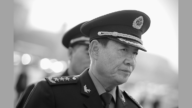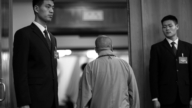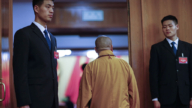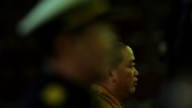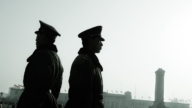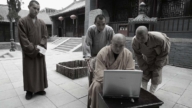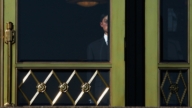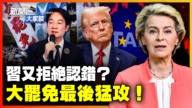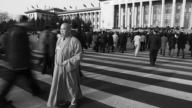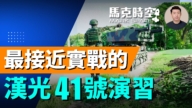【新唐人2012年5月23日讯】在中共以枪杆子和笔杆子当家的理论中,军队一直在中共的权斗中扮演一个最重要的角色。今年的十八大也不列外,一度传出十八大会宣布“军队国家化”,同时军队效忠胡锦涛的声音也不绝于耳。另外,从最近结束的一些省委常委换届来看,大部分没有了军方常委的位置。军队未来将在中国扮演什么样的角色﹖引起了外界的关注。
中共四川省委十届一次全会5月19号,产生了新一届省委常委领导班子。与此前完成换届的陕西、海南省委常委会一样,应配备13名常委的四川省委只有12位,没有了以前的“军方常委”。
时政评论员蓝述表示,王立军、薄熙来事件和陈光诚事件的出现,可能会使中共高层在人事安排和一些决策方面重新安排。
时政评论员 蓝述:“中共的高层很难在各个方面都一下子达成一致,留一些位置,是不是因为中共高层各派目前还在讨价还价﹖”
原“山东大学”历史系教授刘因全认为,可能是这些省的“军方常委”面临退休,而新的还没有确定,他认为,如果要补的话一定是“胡、温、习”的人马。
不过,刘因全分析,十七大前个别省级常委中,也出现过没有军方代表的现象,因此,这届很可能不会再补上。刘因全还表示,军方对地方政府的干预应该越来越少。
刘因全:“我认为这是一个趋势,如果现在开始这样做,这是一个进步,部队就是部队,你像美国这里哪有一个司令员去管地方的事的,我们从历史上看,部队在中国政治舞台上的作用是越来越小的,它是淡化的,像文革时期,那个时候好多省委书记、革委会主任都是部队的人。”
中共喉舌《人民日报》这一段时间一直强调,中共30年的改革先易后难,已经进入攻坚阶段。
蓝述分析,十八大中共高层的人事安排,很可能不会再按照中共传统模式进行搭配。
蓝述:“看这个样子,都和军方今后的定位有关系,习近平他本人是军队背景,又有传出消息说,很可能十八大的改革会把军队国家化,可是从另一方面,军头都在纷纷效忠胡锦涛,不断有风声放出,胡锦涛卸任了之后还会任一段时间的军委主席,军队的这些领导人将在党委里扮演一个什么样的角色,确实是值得观察的。”
按照惯例,中国除少数省级行政区域,如西藏外,多数省级党委常委的配备都是“1+2+10”模式,也就是1位书记,2位副书记,再加上10位常委,其中有一位是军方常委。
采访编辑/刘惠/后制/薛莉
Military Seats Cut In CCP Provincial Standing Committees
A ‘gun’ and a ‘pen’ are the two most crucial tools for
the Chinese Communists Party(CCP)’s ruling in China.
The armed forces have long been deemed the most
important in the CCP’s infighting for power.
The CCP18th Congress is no exception—at the conference,
“Military Nationalization” may be announced, say rumors.
Meanwhile, the army’s oaths of allegiance to Hu Jintao
keep hitting headlines.
Several provinces have seen a cut to the military seats in its
provincial standing committees, from the CCP’s recent shifts.
What a role will the army play in China’s near future?——
This question is arousing the public’s attention.
The 10th CCP Sichuan Provincial Committee’s first plenary
session generated new Standing Committee leaders.
The Party’s new Standing Committee has cut one military
seat to 12 members, from the previous 13.
Shanxi and Hainan Provinces have seen the same cuts
in the leadership transitions.
Critic Lan Shu says, exposures of the Wang Lijun, Bo Xilai
and Chen Guangcheng incidents may have triggered the
CCP’s new personnel and decision-making arrangements.
Lan Shu: “The CCP’s top-level leadership can hardly reach
agreement in all aspects.
Are they leaving some positions unfilled because the top
factional bargaining is still going on within the CCP?”
Former history professor at Shandong Univ., Liu Yinquan,
says these provincial standing committees’ military members
may be facing retirement and new members not yet finalized.
The successful candidates must be minions of Hu Jintao,
Wen Jiabao or Xin Jinping, according to Liu.
Liu observed that the same phenomena had occurred
on the eve of the CCP’s 17th congress.
Liu thinks the position is not likely to be filled during this fall’s
leadership reshuffle.
Liu predicts that, intervention from the military force
with the CCP’s local authorities shall become less and less.
Liu Yinquan: “I think this is a trend; it will be a progress
if it is put into practice from now on.
The troops should keep their own nature, like here in the U.S.
where no commanders intervene with local administration.
Historically, the local authorities’ military’s role has become
increasingly diluted.
In the Cultural Revolution, many provincial Party secretaries
and Revolutionary Committee directors were from the army.”
CCP mouthpiece media, People’s Daily, has recently been
stressing that,
the CCP’s 30-year reform has been going from easy to hard,
and is now entering the crucial stage.
Lan Shu says the top personnel for its18th Congress
will not follow what it was previously.
Lan Shu: “Looks like it’s all linked to the military’s positioning
in the near future; Xi Jinping has a military background.
There came another rumor saying that at the 18th Congress meeting,
The Nationalization of the troops might be announced.
On the other side, the military chiefs have repeatedly
pledged loyalty to Hu Jintao.
Hu is reportedly staying on as the Military Commission head
after leaving office.
What roles will military leaders play in the Party Committee?
—Let’s wait and see.”
Except for in a few provincial administrative areas like Tibet,
the CCP’s usual structure of its provincial Party Committees
are “1-2-10”—1 Party secretary, 2 deputy secretaries and
10 Standing Committee members, with 1 from the military.



